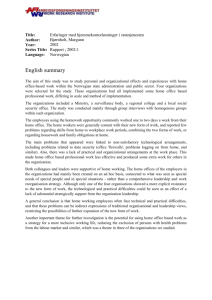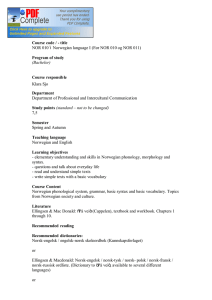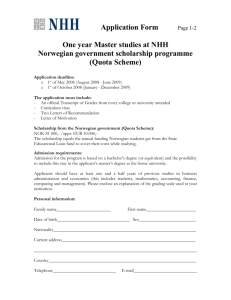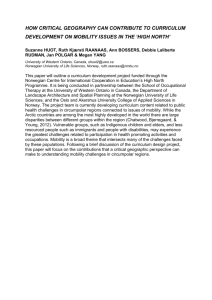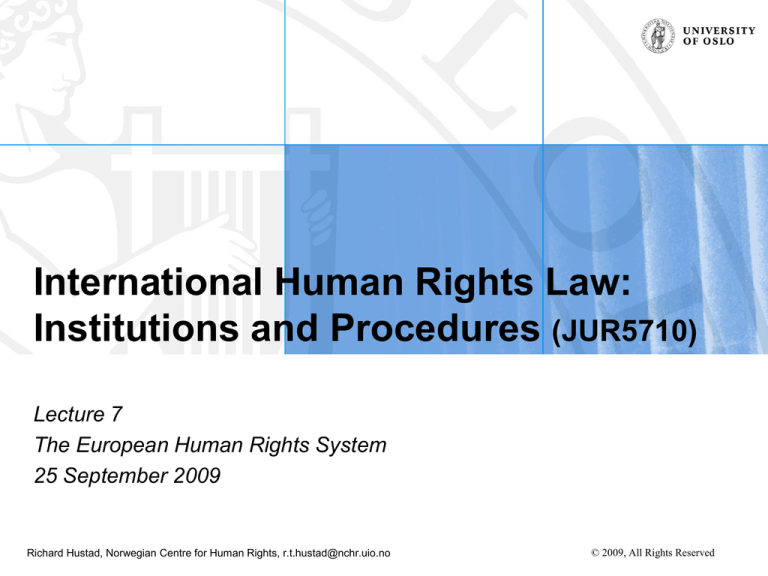
International Human Rights Law:
Institutions and Procedures (JUR5710)
Lecture 7
The European Human Rights System
25 September 2009
Richard Hustad, Norwegian Centre for Human Rights, r.t.hustad@nchr.uio.no
© 2009, All Rights Reserved
Outline of Class
•
Focus
– Exam Responsibility: pensum (Rhona Smith’s conclusory essays)
– Class: cases that explore the legal basis and reasoning of Smith’s essays
•
Format
– Participatory discussion
– Ask questions at any time (there
are no dumb questions)
– Add your ideas or comments at any
time—your views are important
– Question everything (reading,
instructor, yourself)
– The entire PPT will not be covered
in class (it is not meant to be)
Expected Outcome of Class
– Value added to pensum (deeper
understanding)
– Basic knowledge of European HR
system (esp. The European Court
of HR (most jurisprudence)
– Importance: European system is
the most legally effective
Reminder:
•
•
In academia it is your duty to question not only others, but
especially yourself. Scholarship is not about simply
reaffirming one’s own opinions, but challenging those
opinions. The role of professors is to ask the questions that
lead to self-examination and self-criticism.
Richard Hustad, Norwegian Centre for Human Rights, JUR5710 Lecture 7: European HR System
© 2009, All Rights Reserved
European HR Institutions
EU = 27 members
CoE = 47 members
Richard Hustad, Norwegian Centre for Human Rights, JUR5710 Lecture 7: European HR System
OSCE = 56 members
© 2009, All Rights Reserved
European Union
’Constitutional’ Provisions
•
Treaty of the European Union, Art. 6:
– 1. The Union is founded on the principles of liberty, democracy, respect
for human rights and fundamental freedoms, and the rule of law, principles
which are common to the Member States.
– 2. The Union shall respect fundamental rights, as guaranteed by the
European Convention for the Protection of Human Rights and
Fundamental Freedoms signed in Rome on 4 November 1950 and as they
result from the constitutional traditions common to the Member States, as
general principles of Community law.
– 3. The Union shall respect the national identities of its Member States.
– 4. The Union shall provide itself with the means necessary to attain its
objectives and carry through its policies.
•
Art. 11:
– 1. The Union shall define and implement a common foreign and security
policy covering all areas of foreign and security policy, the objectives of
which shall be […] to develop and consolidate democracy and the rule of
law, and respect for human rights and fundamental freedoms.
Richard Hustad, Norwegian Centre for Human Rights, JUR5710 Lecture 7: European HR System
© 2009, All Rights Reserved
European Union
Human Rights as the Gatekeeper
• Treaty of the European Union, Art. 49:
– Any European State which respects the principles set out in Article
6(1) may apply to become a member of the Union. It shall address
its application to the Council, which shall act unanimously after
consulting the Commission and after receiving the assent of the
European Parliament, which shall act by an absolute majority of its
component members.
Richard Hustad, Norwegian Centre for Human Rights, JUR5710 Lecture 7: European HR System
© 2009, All Rights Reserved
European Union
EU-to-State Proceedings
•
Treaty of the European Union, Art. 7:
–
–
–
–
1. On a reasoned proposal by one third of the Member States, by the European
Parliament or by the Commission, the Council, acting by a majority of four fifths of its
members after obtaining the assent of the European Parliament, may determine that
there is a clear risk of a serious breach by a Member State of principles mentioned in
Article 6(1), and address appropriate recommendations to that State. Before making
such a determination, the Council shall hear the Member State in question and, acting
in accordance with the same procedure, may call on independent persons to submit
within a reasonable time limit a report on the situation in the Member State in
question.
The Council shall regularly verify that the grounds on which such a determination was
made continue to apply.
2. The Council, meeting in the composition of the Heads of State or Government and
acting by unanimity on a proposal by one third of the Member States or by the
Commission and after obtaining the assent of the European Parliament, may
determine the existence of a serious and persistent breach by a Member State of
principles mentioned in Article 6(1), after inviting the government of the Member State
in question to submit its observations.
3. Where a determination under paragraph 2 has been made, the Council, acting by
a qualified majority, may decide to suspend certain of the rights deriving from the
application of this Treaty to the Member State in question, including the voting rights of
the representative of the government of that Member State in the Council. In doing so,
the Council shall take into account the possible consequences of such a suspension
on the rights and obligations of natural and legal persons.
Richard Hustad, Norwegian Centre for Human Rights, JUR5710 Lecture 7: European HR System
© 2009, All Rights Reserved
European Union
European Court of Justice
The Seat of the European Court of Justice
The Palais in Luxembourg
Richard Hustad, Norwegian Centre for Human Rights, JUR5710 Lecture 7: European HR System
© 2009, All Rights Reserved
European Court of Justice
• P. v. S. and Cornwall County Council, Case C-13/94
(30 April 1996)
Photo for Illustration Only
Copyright: GNU Free Documentation License
Richard Hustad, Norwegian Centre for Human Rights, JUR5710 Lecture 7: European HR System
© 2009, All Rights Reserved
European Court of Justice
• Society for the Protection of the Unborn Child Ireland Ltd. v.
Steven Grogan, Case C-159/90 (4 October 1991)
Treaty of Rome
Article 59
[…] restrictions on
freedom to provide
services within the
Community shall be
progressively abolished
[…] in respect of nationals
of Member States who are
established in a State of the
Community other than that
of the person for whom the
services are intended.
Demonstration with then-illegal telephone
number for abortion information
Richard Hustad, Norwegian Centre for Human Rights, JUR5710 Lecture 7: European HR System
© 2009, All Rights Reserved
European Court of Justice
• Kadi and Al Barakaat International Foundation v
Council and Commission, Cases C-402/05 P and C415/05 P (3 Sept. 2008)
Photo: © BBC
Yassin Abdullah Kadi
Al-Barakaat International Foundation is a Somali-based
Banking System for Sending Money to Somali from Abroad
Richard Hustad, Norwegian Centre for Human Rights, JUR5710 Lecture 7: European HR System
© 2009, All Rights Reserved
European Court of Justice
•
The Charter of Fundamental Rights of the EU
1. The provisions of this Charter are addressed to the institutions
and bodies of the Union with due regard for the principle of
subsidiarity and to the Member States only when they are
implementing Union law. They shall therefore respect the rights,
observe the principles and promote the application thereof in
accordance with their respective powers.
2. This Charter does not establish any new power or task for the
Community or the Union, or modify powers and tasks defined by
the Treaties.
Richard Hustad, Norwegian Centre for Human Rights, JUR5710 Lecture 7: European HR System
© 2009, All Rights Reserved
Organization for Security and
Cooperation in Europe
Summits
Ministerial Council
High Commissioner
Knut Vollebaek
Permanent Council
Sp. Rep. on Trafficking
Eva Biaudet
Chair-in-Office
Rep. on F of the Media
Miklos Haraszti
The Troika
Secretary-General
High Commissioner on
National Minorities
OSCE Representative
on Freedom of
the Media
Office of the Special Rep. and
Co-ordinator for Combating
Trafficking in Human Beings
Richard Hustad, Norwegian Centre for Human Rights, JUR5710 Lecture 7: European HR System
Office for Democratic
Institutions and
Human Rights
© 2009, All Rights Reserved
Council of Europe
Headquarters of the CoE, The Palace of Europe, Strasbourg
Richard Hustad, Norwegian Centre for Human Rights, JUR5710 Lecture 7: European HR System
© 2009, All Rights Reserved
Council of Europe
HR Institutions
Committee of
Ministers
European Court of
Human Rights
Parliamentary
Assembly
Commissioner for
Human Rights
Philippe Boillat
Director General
Congress of Local
and Regional
Authorities
Committee on Legal
Affairs and
Human Rights
Thomas Hammarberg
Commissioner for HR
European Court
of Human Rights
The E.Commission Against
Racism in 2009
Secretary General
Directorate General
for Human Rights
European Commission
Against Racism &
Intolerance
Jan Helgesen, UiO NCHR
President of the Venice Commission
Venice
Commission
European
Committee of
Social Rights
European Committee
for the Prevention
of Torture
Advisory Committee
on the Framework
Convention for the
Protection of
National Minorities
The European Committee
of Social Rights
Richard Hustad, Norwegian Centre for Human Rights, JUR5710 Lecture 7: European HR System
© 2009, All Rights Reserved
European Court of Human Rights
Interpretation Method
• Golder v. United Kingdom, Report of the Commission (1 June
1973)
– ”The over-riding function of this Convention is to protect the rights of the
individual and not to lay down as between States mutual obligations which
are to be restrictively interpreted having regard to the sovereignty of these
States. On the contrary, the role of the Convention and the function of its
interpretation is to make the protection of the individual effective.”
Richard Hustad, Norwegian Centre for Human Rights, JUR5710 Lecture 7: European HR System
© 2009, All Rights Reserved
European Court of Human Rights
Composition
The Court
Rules of the Court
President of the Court
2 Vice Presidents
of the Court
The Grand Chamber
Section 1
17-Judge
Grand Chamber
Section 2
Section 3
Section 5
Section 4
Section President
Section President
Section President
Section President
Section President
7-Judge Chamber
7-Judge Chamber
7-Judge Chamber
7-Judge Chamber
7-Judge Chamber
3-Judge Committees
3-Judge Committees
3-Judge Committees
3-Judge Committees
3-Judge Committees
Richard Hustad, Norwegian Centre for Human Rights, JUR5710 Lecture 7: European HR System
© 2009, All Rights Reserved
European Court of Human Rights
Process of a Case
1. National Remedies
2. Admissibility Decision
(Committee)
3A. Friendly Settlement
3. Merits Decision
(Chamber)
4. Appeal
(Grand Chamber)
5. Enforcement
(Committee of Ministers)
Richard Hustad, Norwegian Centre for Human Rights, JUR5710 Lecture 7: European HR System
© 2009, All Rights Reserved
Inter-state Complaints
• Article 33:
– ”Any High Contracting Party may refer to the Commission, through the
Secretary General of the Council of Europe, any alleged breach of the
provisions of the Convention by another High Contracting Party.”
• Austria v. Italy:
– ”[T]he obligations undertaken by the High Contracting Parties in the
Convenion are essentially of an objective character, being designed rather
to protect the fundamental rights of individual human beings from
infringement by any of the High Contractin Parties than to create subjective
and reciprocal rights for the High Contracting Parties themselves.”
• The Greek Case & Cyprus v. Turkey Cases:
– Scandinavian countries and the Netherlands (and France in the latter)
instituted inter-state complaints without any particular national interest or
citizenship interest involved.
Richard Hustad, Norwegian Centre for Human Rights, JUR5710 Lecture 7: European HR System
© 2009, All Rights Reserved
Inter-state Complaints
• The Greek Case:
–
–
–
–
Coup d etat in Greece
Case brought to Commission
Greece denounces the ECHR and withdraws from the CoE
Commission continued investigation and decision in the case (now
58 (2))
– The coup government falls
• France and others v. Turkey:
– Military government in Turkey
– Case brought to Commission
– Friendly settlement reached where Turkey will regularly report to
the Commission on measures in its internal law to prevent torture
– Civilian government emerges
Richard Hustad, Norwegian Centre for Human Rights, JUR5710 Lecture 7: European HR System
© 2009, All Rights Reserved
Inter-state Complaints
• Cyprus v. Turkey:
–
–
–
–
–
–
Turkey invades Cyprus
Case brought to the Commission
Commission issues report of HR violations
Turkey had not accepted jurisdiction of the Court
Case goes directly to Committee of Ministers
CoM requests that Turkey take measures to end the violations and
urged all parties ”to resume intercommunal talks”
– Two years later, the CoM regreted no steps had been taken;
decided ”strongly to urge the parties to resume intercommunal
talks […];” and considered ”this decision as completing its
considerations of the case Cyprus versus Turkey.”
Richard Hustad, Norwegian Centre for Human Rights, JUR5710 Lecture 7: European HR System
© 2009, All Rights Reserved
Advisory Opinions
• Article 47 (1):
– ”The Court may, at the request of the Committee of Ministers, give
advisory opinions on legal questions concerning the interpretation
of the Covnetion and the protocols thereto.”
• CoM Request for Advisory Opinion on CIS
Convention’s compatibility with the ECHR:
– ”The Court considers that the purpose of the provisions excluding
its advisory jurisdiction is to avoid the potential situation in which
the Court adopts in an advisory opinion a position which might
prejudice its later examination of an application brought under
Article 33 and 34 of the Convention […].”
Richard Hustad, Norwegian Centre for Human Rights, JUR5710 Lecture 7: European HR System
© 2009, All Rights Reserved
European Court of Human Rights
”Victim”
• Article 34
– ”The Court may receive applications from any person, nongovernmental organisation or group of individuals claiming to be
the victim of a violation by one of the High Contracting Parties of
the rights set forth in the Convention or the protocols thereto.”
Richard Hustad, Norwegian Centre for Human Rights, JUR5710 Lecture 7: European HR System
© 2009, All Rights Reserved
European Court of Human Rights
Potential Victims
• X v. Sweden, No. 6853/74 (), para. 236.
Applicants were Toddlers who Would Likely be Affected by the Legislation
Photo for illustration purposes only.
Richard Hustad, Norwegian Centre for Human Rights, JUR5710 Lecture 7: European HR System
© 2009, All Rights Reserved
European Court of Human Rights
Potential Victims
• Open Door and Dublic Well Woman v. Ireland, No.
6959/75 (29 October 1992), para. 44
A pro-choice rally in Dublin, Ireland
Photo for illustration purposes only.
Richard Hustad, Norwegian Centre for Human Rights, JUR5710 Lecture 7: European HR System
© 2009, All Rights Reserved
European Court of Human Rights
Potential Victims
• Klass and Others v. Germany, No. 6853/74 (6
September 1978), paras. 34 & 36:
Applicants Were Concerned that their Telephone Might be Tapped
Photo for illustration purposes only.
Richard Hustad, Norwegian Centre for Human Rights, JUR5710 Lecture 7: European HR System
© 2009, All Rights Reserved
European Court of Human Rights
’Waived’ Rights
• The Vagrancy Case, (18 June 1971), para. 65:
Applicant Wanted a Warm Bed so Surrendered Himself to Police
Photo for illustration purposes only.
Richard Hustad, Norwegian Centre for Human Rights, JUR5710 Lecture 7: European HR System
© 2009, All Rights Reserved
European Court of Human Rights
Indirect Victims
• X v. France, (31 March 1992):
Applicant Died During Case that Claimed Delay in Administrative Proceedings Following
his Infection with HIV/AIDS as a result of a Blood Transfusion
Photo for illustration purposes only.
Richard Hustad, Norwegian Centre for Human Rights, JUR5710 Lecture 7: European HR System
© 2009, All Rights Reserved
European Court of Human Rights
Indirect Victims
•
Karner v. Austria, 38 EHRR 24 (2004):
–
–
–
–
–
–
–
Applicant died during proceedings and parents explicitly did not wish to pursue the
matter.
Applicant’s attorney requested to continue the matter.
”[T]his Court has to determined whether the application in the present case should
also be struck out of the list. In formulating an appropriate answer to this question, the
object and purpose of the Convention system as such must be taken into account.”
”Article 34 does not institute for individuals a kind of actio popularis for the
interpretation of the Convention; it does not permit individuals to complain against a
law in abstracto simply because they feel that it contravenes the Convention.”
”[H]uman rights cases before the Court generally also have a moral dimension.”
”[J]udgments in fact serve not only to decide those cases brought before the Court,
but, more generally, to elucidate, safeguard and develop the rules instituted by the
Convention, thereby contributing to the observance by the States of the engagements
undertaken by them as Contracting Parties.”
”Although the primary purpose of the Convention is to provide individual relief, its
mission is also to determine issues on public-policy grounds in the common interest,
thereby raising the general standards of protection of human rights […].”
”The Court considers that the subject matter of the present application […] involves an
important question of general interest not only for Austria but also for other States
Parties to the Convention.”
Richard Hustad, Norwegian Centre for Human Rights, JUR5710 Lecture 7: European HR System
© 2009, All Rights Reserved
European Court of Human Rights
Exhaustion of Domestic Remedies
• Article 35 (1):
– ”The Court may only deal with the matter after all domestic
remedies have been exhausted, according to the generally
recognized rules of international law […].”
Richard Hustad, Norwegian Centre for Human Rights, JUR5710 Lecture 7: European HR System
© 2009, All Rights Reserved
European Court of Human Rights
Exhaustion of Domestic Remedies
• Isayeva, Yusupova, Bazayava v. Russia, (24 February 2005),
paras. 144-145:
– ”[T]he Convention obliges applicants first to use the remedies that are
normally available and sufficient in the domestic legal system […].”
– ”The existence of the remedies must be sufficiently certain, in practice as
well as in theory, failing which they will lack the requisite accessibility and
effectiveness.”
– ”No recourse should be had to remedies which are inadequate or
ineffective.”
– ”Article 35 (1) must be applied with some degree of flexibility and without
excessive formalism. […T]he rule of exhaustion is neither absolute nor
capable of being applied automatically; for the purposes of reviewing
whether it has been observed, it is essential to have regard to the
circumstances of the individual case. This means, in particular, that the
Court must take realistic account not only of the existence of formal
remedies in the legal system of the Contracting State concerned but also of
the general context in which they operation, as well as the personal
circumstances of the applicant.”
– ”It must then examine whether, in all the circumstances of the case, the
applicant did everything that could reasonably be expected of him or her to
exhaust domestic remedies.”
Richard Hustad, Norwegian Centre for Human Rights, JUR5710 Lecture 7: European HR System
© 2009, All Rights Reserved
European Court of Human Rights
Exhaustion of Domestic Remedies
• Isayeva, Yusupova, Bazayava v. Russia, (24
February 2005):
A Street in Grozny, Chechnya
Photo for illustration purposes only.
Richard Hustad, Norwegian Centre for Human Rights, JUR5710 Lecture 7: European HR System
© 2009, All Rights Reserved
European Court of Human Rights
Exhaustion of Domestic Remedies
• Cyprus v. Turkey IV, 2004 ECHR 172(24 February 2005),
paras. 144-145:
– ”[I]n the area of the exhaustion of domestic remedies, there is a distribution
of the burden of proof.”
– ”It is the responsibility of the respondent Government claiming nonexhaustion to satisfy the Court that the remedy was an effective one
available in theory and in practice at the relevant time, that is to say, that it
was accessible, was one which was capable of providing redress in
respect of the aggrieved individuals’ complaints and offered reasonable
prospects of success.”
– After this is demonstrated by the respondent Government, the applicant
must ”establish that the remedy advanced […] was in fact exhausted or
was for some reason inadequate or ineffective in the particular
circumstance of the case, or that there existed special circumstances
absolving […] the requirement […].”
– Thereafter, it is once again the respondent Government that would have
the burden of demonstrating the failure to fulfill an effective remedy.
Richard Hustad, Norwegian Centre for Human Rights, JUR5710 Lecture 7: European HR System
© 2009, All Rights Reserved
European Court of Human Rights
Exhaustion of Domestic Remedies
• Ireland v. United Kingdom, (1978), para. 159:
– A ”practice” of widespread linked breaches of Convention rights
does not require exhaustion of remedies.
– ”A practice incompatible with the Convention consists of an
accumulation of identical or analogous breaches which are
sufficiently numerous and inter-connected to amount not merely to
isolated incidents or exceptions but to a pattern or system […].”
– ”It is inconceivable that the higher authorities of a State should be,
or at least should be entitled to be, unaware of the existence of
such a practice.”
Richard Hustad, Norwegian Centre for Human Rights, JUR5710 Lecture 7: European HR System
© 2009, All Rights Reserved
European Court of Human Rights
Six-month Rule
• Article 35 (1)
– ”The Court may only deal with the matter […] within a period of six months
from the date on which the final decision was taken.”
• Allan v. United Kingdom, Case No. 48539/99 (28 August 2001):
– ”The running of the six month time-limit imposed by Article 35 (1) is, as a
general rule, interrupted by the first letter from the applicant indicating an
intention to lodge an application and giving some indication of the nature of
the complaints made. As regards complaints not included in the initial
application, the running of the six month time-limit is not interrupted until
the date when the complaints are first submitted to the Court.”
• Walker v. United Kingdom, Case No. 34979/97 (25 January
2000):
– It is ”recalled that that this rule, in reflecting the wish of the Contracting
Parties to prevent past decisions being called into question after an
indefinite lapse of time, serves the interests not only of the respondent
Government but also of legal certainly itself.”
Richard Hustad, Norwegian Centre for Human Rights, JUR5710 Lecture 7: European HR System
© 2009, All Rights Reserved
European Court of Human Rights
Same-matter Rule
• Article 35 (2) (b):
– Applications are inadmissible which have ”already been submitted
to another procedure of international investigation or settlement
and contain no relevant new information.”
• Smirnova v. Russia, Case No. 46133/99 (3 October
2002):
– The applicant brought a case to both the ECtHR and the UN
Human Rights Committee alleging violations of criminal procedure
(unlawful arrest).
– The ECtHR complaint had the additional factual statement that the
applicant had been forced to surrender her identity documents to
the district court.
– Russia claimed the case was inadmissible based on Article 35 (2)
Richard Hustad, Norwegian Centre for Human Rights, JUR5710 Lecture 7: European HR System
© 2009, All Rights Reserved
European Court of Human Rights
Incompatible Claims
• Article 35 (3):
– ”The Court shall declare inadmissible any individual application submitted
under Article 34 which it considers incompatible with the provisions of
Covention or Protocols thereto.”
• Yonghong v. Portugal, Case No. 50887/99 (25 November 1999)
– Ratione loci (territorial jurisdiction)
– Portugal had never made an Art. 56 declaration extending the Convention
to Macao.
• Kozak v. Ukraine, Case No. 21291/02 (17 Decemer 2002)
– Ratione temporis (temporal jurisdiction)
– Ukraine was not a party to the ECHR when the applicants land title was
confiscated.
• Frette v. France, Case No. 36515/97 (June 2001)
– Ratione materiae (subject matter jurisdiction)
– The applicants claim of right of adoption is not contained in the ECHR.
Richard Hustad, Norwegian Centre for Human Rights, JUR5710 Lecture 7: European HR System
© 2009, All Rights Reserved
European Court of Human Rights
Jurisdiction
• Ilascu and others v. Moldova and Russia, Case No. 48787/99
(8 July 2004)
Responsibility of Russia because of Continuous and Active Support of
Moldavian Republic of Transdniestria
Richard Hustad, Norwegian Centre for Human Rights, JUR5710 Lecture 7: European HR System
© 2009, All Rights Reserved
European Court of Human Rights
Jurisdiction
• Bankovic and others v. Belgium and 16 other Contracting
States, Case No. 52207/99 (12 December 2001)
Ksenija Bankovic was at the RTS Television Station in Belgrade when it was Bombed by NATO planes
Richard Hustad, Norwegian Centre for Human Rights, JUR5710 Lecture 7: European HR System
© 2009, All Rights Reserved
European Court of Human Rights
Abuse of the Right of Petition
• Article 35 (3):
– ”The Court shall declare inadmissible any individual application submitted
under Article 34 which it considers […] an abuse of the right of application.”
• Duringer and others v. France, Case No. 61164/00 (4 February
2003):
– ”The applications of Mssrs Duringer and ’Forest Grunge’ were held
inadmissible: those applicants had sent numerous communications
containing serious accusations against judges of the Court and officials of
the Registry and statements without any foundation which were extremely
insulting and wild and repeatedly reiterated, and did not fall within the amibt
of Article 34 […].”
– ”The intolerable conduct of Mr. Gerard Duringer and, assuming that he
existed, ’Forest Grunge’ was contrary to the aim of the right of individual
application […].”
• Jian v. Romania, Case No. 46640/99 (30 March 2004):
– The applicant forged documents material to his allegations of ill-treatment.
– ”This was a flagrant and aggravated abuse of the right of application.”
– The case was declared inadmissible.
Richard Hustad, Norwegian Centre for Human Rights, JUR5710 Lecture 7: European HR System
© 2009, All Rights Reserved
European Court of Human Rights
Interim Measures
• Article 34:
– ”The High Contracting Parties undertake not to hinder in any way the
effective exercise of [the] right [of individual applications].”
• Mamatkulov and Askarov v. Turkey, (4 February 2005):
– The applicants were from Uzbekistan, which wanted them for alleged
terrorist activities and attemted assassination of the President of that
country.
– They were arrested in Turkey and extradition ordered.
– Both appealed to the ECtHR which issued a statement to Turkey under
Rule 39 of the rules of the Court that the applications should not be
extradited until the matter is dealt with by the Court.
– The applicants claimed that they would be mistreated, not receive a fair
trial in Uzbekistan, and potentially receive the death penalty.
– Turkey extradited one week later.
– During the progress of the case, Turkey notified the Court that the
applicants had been sentenced to jail terms of 20 years and 11 years, that
Turkey had visited them and they were in good health and without
complaints, and that they were able to receive visitors.
Richard Hustad, Norwegian Centre for Human Rights, JUR5710 Lecture 7: European HR System
© 2009, All Rights Reserved
European Court of Human Rights
Standard of Review on the Merits
• Ireland v. United Kingdom (18 January 1978)
• Cyprus v. Turkey IV, 2001 ECHR:
– ”The Court also observes that in its assessment of the evidence in relation
to the various complaints declared admissible, the Commission applied the
standard of proof ”beyond a reasonable doubt” as enunciated by the Court
in its Ireland v. UK judgment […] it being noted that such proof may follow
from the coexistence of sufficiently strong, clear and concordant inferences
or of similar unrebutted presumptions of fact.”
– The Court, for its part, endorses the application of this standard, all the
more so since it was first articulated in the context of previous inter-State
case and has, since the date of the adoption of the judgment in that case,
become part of the Court’s established case-law (for a recent example, see
Salman v. Turkey […]).”
Richard Hustad, Norwegian Centre for Human Rights, JUR5710 Lecture 7: European HR System
© 2009, All Rights Reserved
European Court of Human Rights
Interpretation Method
• Golder v. United Kingdom, Report of the Commission (1 June
1973)
– ”The over-riding function of this Convention is to protect the rights of the
individual and not to lay down as between States mutual obligations which
are to be restrictively interpreted having regard to the sovereignty of these
States. On the contrary, the role of the Convention and the function of its
interpretation is to make the protection of the individual effective.”
Richard Hustad, Norwegian Centre for Human Rights, JUR5710 Lecture 7: European HR System
© 2009, All Rights Reserved
European Court of Human Rights
Margin of Appreciation
•
Rasmussen v. Denmark, 7 EHRR 372 (28 November 1984):
– An important issue for determine the width of the MoA is whether there is
common ground among the State Parties to the Convention. Lack of
common ground results in a wider MoA.
•
Handyside v. United Kingdom, Case No. 5493/72 (7 December 1976):
– Social conditions within the country in question are an important factor in
the MoA.
– Domestic judges are in a better position to determine issues of public
morals (thus, a wider MoA)
•
Brannigan and McBride v. United Kingdom, 17 EHRR 539 (26 May
1993), para. 43:
– Domestic judges are in a better position to determine whether an
emergency exists that threatens the life of the nation and the necessity of
derogations.
– ”[I]n exercising its supervision the Court must give appropriate weight to
such relevant factors as the nature of the rights affected by the derogation,
the circumstances leading to, and the duration of, the emergency
situation.”
Richard Hustad, Norwegian Centre for Human Rights, JUR5710 Lecture 7: European HR System
© 2009, All Rights Reserved
European Court of Human Rights
Necessary in a Democracy
• Gorzelik and others v. Poland, Case No. 44158/98 (17 February
2004), para. 89:
– ”[N]ot only is political democracy a fundamental feature of the European
public order but the Convention was designed to promote and maintain the
ideals and values of a democratic society. Democracy […] is the only
political model contemplated in the Convention and the only one
compatible with it. […] The only necessity capable of justifying an
interference with any of the rights enshrined in those Articles is one that
must claim to spring from ’democratic society.’ ”
• Refah Partisi (The Welfare Party) and Others v. Turkey, Case
Nos. 41340/98, 41342/98 and 41344/98 (13 February 2003)
Richard Hustad, Norwegian Centre for Human Rights, JUR5710 Lecture 7: European HR System
© 2009, All Rights Reserved
European Court of Human Rights
Judgments are Binding
•
Article 46 (1):
–
•
”The High Contracting Parties undertake to abide by the final judgment of the Court in
any case to which they are parties.”
Loizidou v. Turkey, CoM Interim Resolution ResDH (2001) 80 (adopted 26 June
2001):
–
–
–
–
–
–
–
”Having regard tot he judgment of the European Court of Human Rights (’the Court
below) of 28 July 1998 which ordered Turkey to pay to the applicant before 28
October 1998 specific sums for damages and for costs and expenses;”
”Very deeply deploring the fact that, to date, Turkey has still not complied with its
obligations under this judgment;”
”Stressing that every Member State of the Council of Europe must accept the
principles of the rule of law and of the enjoyment by all persons within its jurisdiction of
human rights and fundmental freedoms;”
”Stressing that acceptance of the convention, including the compulsory jurisdiction of
the Court and the binding nature of its judgments, has become a requirement for
Membership of the Organisation;”
”Stressing that acceptance of the Convention is a system for the collective
enforcement of the rights protected therein;”
”Declares the Committee’s resolve to ensure, with all means available to the
Organisation, Turkey’s compliance with its obligations under this judgment;”
”Calls upon the authorities of the Member States to take such action as they deem
appropriate to this end.”
Richard Hustad, Norwegian Centre for Human Rights, JUR5710 Lecture 7: European HR System
© 2009, All Rights Reserved
European Court of Human Rights
Pending Cases
• Number of cases forwarded to a Committee for determination of
admissibility in 2008: 49,900
• Total number of cases pending before the Court, as of 1
January 2009: 97,300
–
–
–
–
–
–
27,250 against Russia
11,100 against Turkey
8,900 against Romania
8,250 against Ukraine
4,200 against Italy
3,500 against Poland
Richard Hustad, Norwegian Centre for Human Rights, JUR5710 Lecture 7: European HR System
© 2009, All Rights Reserved
Contact Info:
Richard Hustad
Phone: 22 84 20 58
E-mail: r.t.hustad@nchr.uio.no
Office: Norwegian Centre for Human Rights, Room 344
© 2009
•
•
•
•
•
This presentation is the copyright of Richard Hustad.
All rights are reserved. There is no claim to any of the photographs, illustrations, or
quotations—all of which are either in the public domain or are a fair use exception to
copyright protection for educational purposes.
Except for the quotation of short passages for the purposes of criticsm and review, no part
of this publication may be represented, reproduced, stored in a retrieval system, or
transmitted, in any form or by any means, electronic, mechanical, photocopying, recording
or otherwise, without the prior written permission of the author.
Permission is expressly granted for educational or any other not-for-profit purpose as long
as credit is attributed according to contemporary methods and the author is notified in
writing. The author retains the right to revoke this grant at any time, retaining sole discretion
to do so.
(This presentation has been created solely for educational purposes and reflects the
research on and conceptualization of the topic by the author. The copyright claim is exerted
primarily to prevent other lecturers from presenting it as their own work.)
Richard Hustad, Norwegian Centre for Human Rights, JUR5710 Lecture 7: European HR System
© 2009, All Rights Reserved



